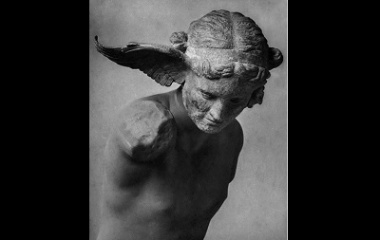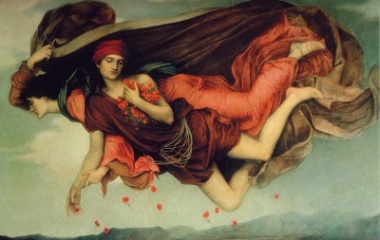- Pronunciation: hip-nos
- Origin: Greek
- Roman counterpart: Somnus
- Role: God of sleep
- Symbols: Inverted torch, horn of sleep, poppy plant
- Parents: Nyx, Erebus
- Twin: Thanatos
- Wife: Pasithea
- Children: Morpheus, Phobetor, Phantasus, and Ikelos
Who Is Hypnos?
The Greek god of sleep is Hypnos, whose mission is to help people sleep soundly. His twin brother Thanatos is the god of a peaceful death. Together, they were able to help humans avoid suffering and die peacefully while they slept. The twins are the children of Nyx, the goddess of the Night, and Erebus, god of darkness.
There are different stories regarding the home of Hypnos. Some believe he lived in the underworld in a dark cave lined with opiate blooms. Another myth suggests that he lived under the Greek island of Lemnos, in a cave that had the river of forgetfulness flowing through it.
Tales of Hypnos
There are numerous myths related to the god of sleep. Two of the most famous tales are based on text from Homer’s Iliad and reveal how Hypnos outsmarted and overpowered Zeus, the king of the gods, under the direction of the goddess Hera, the wife of Zeus.
Hera didn’t care for Zeus’s son Heracles from the time he was born. Heracles was conceived during one of her husband’s numerous affairs. His mother was Zeus’s human mistress, Alcmene, and Heracles soon grew big and strong. Years before the Trojan War began, he took his men on an expedition to Troy. They destroyed much of the city, and killed the king. Hera summoned Hypnos and asked him to put Zeus to sleep. Next, she proceeded to send storm winds over the waters during the time when Heracles and his men were navigating their ship home. When Zeus woke up and became aware he had been tricked, he was very angry with Hypnos, who managed to avoid his wrath by hiding in the underworld cave of his mother.
Much later, the constantly plotting Hera wanted to help the Achaeans who were losing the Trojan War, so she asked Hypnos the very dangerous favor of putting her husband to sleep again so she could proceed with her plan.
Hypnos was reluctant to use trickery once again on the father of the gods. Hera tried to persuade him with gifts, but Hypnos was reluctant to push his luck again with Zeus and initially refused. Finally, he agreed to do it, on the condition that he would be awarded the grace goddess Pasithea as his bride.
Hera went to see Zeus under the pretense of wanting to discuss her arguing parents. Perfumed and coifed, she looked so beautiful that Zeus could not resist her charms. Just as he reached out to put his arms around her, Hypnos made Zeus fall asleep.
Hera then transformed Hypnos into a bird and he quickly flew to Poseidon to inform him that he could help the Achaeans while Zeus was sleeping. The Greeks won the war, and Zeus never found out that he had been fooled once again.
Family of Hypnos
The clan of Hypnos were the gods and goddesses of Greek mythology that controlled dreams and sleep, as well as death and fear.
Parents
Nyx and Erebus, the goddess of the night and the god of darkness were primordial deities. They were two of five siblings born from Chaos, the very first goddess at the beginning of the world. The pair had many children together, including Hypnos and his twin brother Thanatos.
Oneiroi
The four children of the god of sleep are the influencers of dreams. They are referred to as the Onerioi, which meant dreams in ancient Greece. Morpheus is the most influential as he was the shaper of the dreams. It was said that he slept in a dark cave lined with narcotic poppy flowers. Phobetor was the creator of nightmares, and could take on various forms of animals and monsters in dreams. Phantasus transformed into objects, while Ikelos represented the people in dreams of illusion and prophecy.
Linguistic Influence
Although Hypnos did play a role in some important tales in Greek Mythology, he is considered a minor deity. Despite this, a great many words in the English language are derived from both his name, and the names of his family members. The word hypnosis is extracted directly from his name. Euthanasia means good death, and its derivation is Thanatos. The condition of not sleeping, insomnia, is from the name of Hypnos’ Roman counterpart, Somnus. Phobos is the Greek word for fear or phobia, rooted in Phobetor, and the drug morphine is named for Morpheus, the dream shaper who slept among the poppy flowers.











This helped me alottttttttttttttt
same
Me too
anyone do work citied for this
This was very helpful for my report
me too